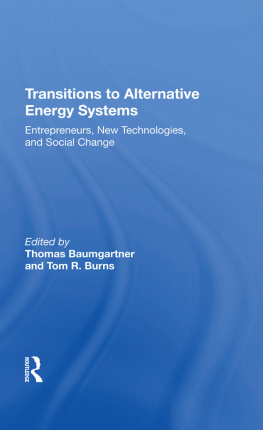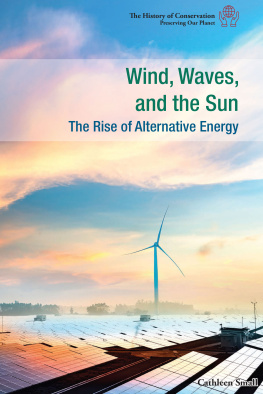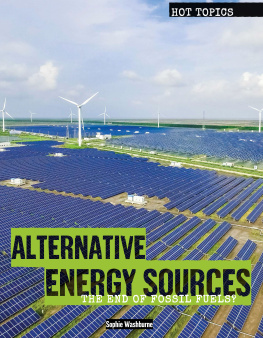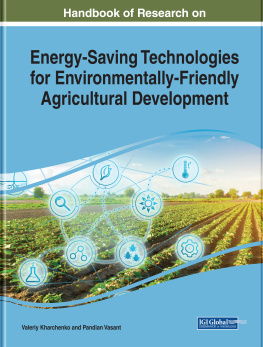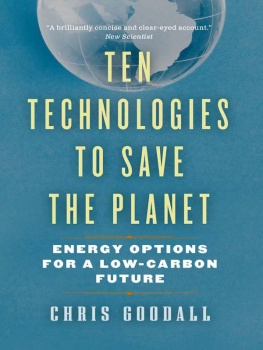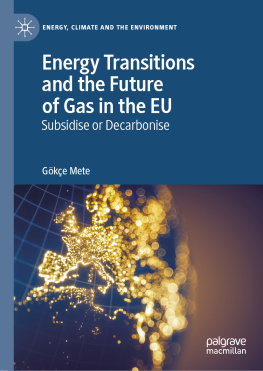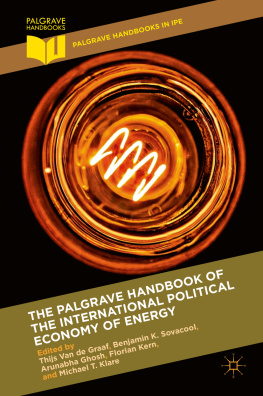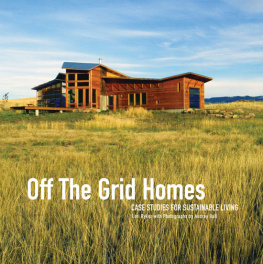Transitions to Alternative Energy Systems
Westview Replica Editions
The concept of Westview Replica Editions is a response to the continuing crisis in academic and informational publishing. Library budgets for books have been severely curtailed. Ever larger portions of general library budgets are being diverted from the purchase of books and used for data banks, computers, micromedia, and other methods of information retrieval. Inter-library loan structures further reduce the edition sizes required to satisfy the needs of the scholarly community. Economic pressures on the university presses and the few private scholarly publishing companies have severely limited the capacity of the industry to properly serve the academic and research communities. As a result, many manuscripts dealing with important subjects, often representing the highest level of scholarship, are no longer economically viable publishing projectsor, if accepted for publication, are typically subject to lead times ranging from one to three years.
Westview Replica Editions are our practical solution to the problem. We accept a manuscript in camera-ready form, typed according to our specifications, and move it immediately into the production process. As always, the selection criteria include the importance of the subject, the works contribution to scholarship, and its insight, originality of thought, and excellence of exposition. The responsibility for editing and proofreading lies with the author or sponsoring institution. We prepare chapter headings and display pages, file for copyright, and obtain Library of Congress Cataloging in Publication Data. A detailed manual contains simple instructions for preparing the final typescript, and our editorial staff is always available to answer questions.
The end result is a book printed on acid-free paper and bound in sturdy library-quality soft covers. We manufacture these books ourselves using equipment that does not require a lengthy make-ready process and that allows us to publish first editions of 300 to 600 copies and to reprint even smaller quantities as needed. Thus, we can produce Replica Editions quickly and can keep even very specialized books in print as long as there is a demand for them.
About the Book and Editors
Transitions to Alternative Energy Systems:Entrepreneurs, New Technologies, and Social Change
edited by Thomas Baumgartner and Tom R. Bums
This book offers a comparative analysis of seven case studies that provide insight into the factors that have facilitated or blocked the emergence of alternative energy production and use systems. The authors suggest that the actors (public or private, individual or collective) who provide information and know-how are extremely important in determining the speed with which a new energy technology is adopted. They stress the importance of incorporating legal, organizational, institutional, and social factors with economic and technical considerations in planning and managing the energy transition process.
Thomas Baumgartner is presently working as a research consultant based in Zurich. Tom R. Burns is professor of sociology at the University of Uppsala, Sweden, and head of policy research at SIFO, the Swedish Institute for Opinion Research.
First published 1984 by Westview Press
Published 2018 by Routledge
52 Vanderbilt Avenue, New York, NY 10017
2 Park Square, Milton Park, Abingdon, Oxon OX14 4RN
Routledge is an imprint of the Taylor & Francis Group, an informa business
Copyright 1984 by Taylor & Francis
All rights reserved. No part of this book may be reprinted or reproduced or utilised in any form or by any electronic, mechanical, or other means, now known or hereafter invented, including photocopying and recording, or in any information storage or retrieval system, without permission in writing from the publishers.
Notice:
Product or corporate names may be trademarks or registered trademarks, and are used only for identification and explanation without intent to infringe.
Library of Congress Cataloging in Publication Data
Main entry under title:
Transitions to alternative energy systems.
(A Westview replica edition)
1. Renewable energy sources. 2. Energy policy. I. Baumgartner, Thomas
(Thomas Martin) II. Burns, Tom R.
TJ163.2.T7 1984 333.79'15 82-11089
ISBN 13: 978-0-367-21227-8 (hbk)
Contents
Denis Bayes
PART I
THE SHAPING OF ALTERNATIVE ENERGY SYSTEMS
Tom R. Burns and Thomas Baumgartner
Tom R. Burns and Thomas Baumgartner
PART II
CONSUMER-ORIENTED TECHNOLOGIES
Halfdan Farstad
James Ward
Halfdan Farstad and James Ward
Hans Diefenbacher
PART III
PRODUCER-ORIENTED TECHNOLOGIES
James Ward
Mark Diffenderfer
Jan-Inge Lind
PART IV
ANALYSIS, THEORY, AND NORMATIVE CONCLUSIONS
Thomas Baumgartner and Tom R. Bums
Tom R. Bums and Thomas Baumgartner
Tom R. Bums and Thomas Baumgartner
Denis Hayes
The industrial world was built to run on cheap oil, and now the cheap oil has run out. For a while longer, the West will depend for its energy upon expensive oilmuch of it obtained from sources that are geographically remote or politically unstable. But in the near future, the world must shift from oil to other sources of energy. TRANSITIONS TO ALTERNATIVE ENERGY SYSTEMS explores how such change can best be encouraged.
Three proven energy sources are available to replace oil and gas: nuclear power, solid fossil fuels, and renewable energy resources. None is without problems. But the problems associated with renewable energy development appear to be solvable, while those afflicting the nuclear and fossil options appear to be intractable.
In assessing something as sweeping as an energy transition, it is often helpful to view issues in a broad context. In looking at the consequences of choosing nuclear power of coal as the centerpiece of a global energy strategy, lets hypothesize that each of these sources provides half the commercial energy needed by the entire world fifty years hence.
To produce this amount of energy from nuclear power would require the annual use of between seven million and twenty million kilograms of some fissile isotopeprobably plutonium-239. In the hands of a sophisticated bomb maker, four kilograms can make a nuclear explosive. Even if the lower end conventional projections of energy demand prove to be too high by a factor of almost two, there would still be enough plutonium in circulation each It would not lead to the kind of world that most of us find very attractive.
Coal, oil shale, and bituminous sands face a similarly unsolvable problem. The energy they contain cannot be released without producing carbon dioxide. A 1,000 MW coal-fired power plant emits about 270 kilograms of carbon dioxide a second, or 16 metric tons a minute. No economically plausible way to capture any significant fraction of this gas has yet been suggested. If, fifty years from now, half the worlds energy were obtained from solid fossil fuels, atmospheric carbon dioxide would be increasing at almost 4 percent per year. If all the worlds coal were burned, atmospheric carbon dioxide could increase eightfold. The climatic consequences of a doubling of carbon dioxide are uncertain, but a near-consensus in the atmospheric research community holds that they would be dire. These include the parching of the North American breadbasket and the flooding of the Netherlands and of the rice-producing river deltas of East Asia. Because of industrial development, the atmosphere already contains much more carbon dioxide than at any time since the evolution of Homo sapiens . We would be wise not to pursue an energy strategy calculated to accelerate the rate of increase.

